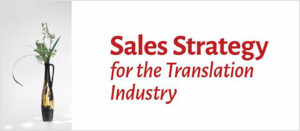With the continued growth of the translation industry, there is a need for a new species of employees in almost every company we know. These are sales people and the thing is clients are so complicated sometimes that PMs are not enough if your company aims for constant strategic growth.
It is not because PMs lack skills! On the contrary – from a sales point of view they are the easy way in to talk with a decision-maker in a company. Their position, however, holds other key responsibilities and they are simply not as efficient in selling the services we’d like to sell as would be a dedicated sales person.
As our Executive Manager for Europe Yana Dinchiyska likes to say: there are 3 things one would associate with Asia, when it pops out in a conversation:
- Cheap goods
- Beautiful travel locations
- Rich history
And these presumptions quite often are not in our favour. If you have decided to go along the line to develop Asian languages translation as a service that is part of your portfolio, you might be asked these same questions. With this article we want to give you some insight on how to go around them, as we’ve already had that conversation with quite a few of our long-term partners. The most probable outcome is: if you tackle them the right way, you’ll end up with such long-term partnerships, too.
Do your research before asking any questions!!!!
There is nothing more frustrating for a potential customer to receive a bad sales email from a company that otherwise seems very reliable. I’ll tell you why I say this. Currently there is a lot of emailing done in the translation industry. When I receive an email from a sales person in a company that is already working with us and it either doesn’t mention this or it is obvious it is just a copy-paste from a template that speaks for itself.
My conclusion is that first and foremost no initial research was done and the minimum effort hasn’t been done to check if we are already working together. Secondly, either the person is not a professional or doesn’t really care who is on the other side.
And that is a mass practise at that very moment!
So a few basic steps:
- Check your database
- Check the company’s website
- Learn who is the decision maker
- Personalize your emails
Learn who is the client of your client
 Is your potential client working with LSPs only or with end-clients? What do they sell and to whom? What is their company strategy for gaining more clients?
Is your potential client working with LSPs only or with end-clients? What do they sell and to whom? What is their company strategy for gaining more clients?
The more you know about the target of your clients the more you can adapt the conversation in your favour. Why?
It is simple: show your value and how it will help them in gaining more customers and they’ll be happy to work with you.
When we relate this to Asian languages it is quite simple: ask them if their clients are interested in expansion? If their main goal is to gain a new service? Check if their portfolio has only a few services and offer them the option for more.
Ask about the problems!
You might find it senseless – to actually encourage people to burden you with their own problems. The thing is you do want their burden on your shoulders mainly because this is why they’ll choose you to work with. What customer’s want is their problems gone and if you know them, you can find a way around them.
If the quality of their current Asian vendor is poor, offer some tests or show ISO certification.
If they lack a certain pair of languages, they’ll probably share it and you’ll know how to tailor your offer later on.
Talk less, listen more!
A final piece of advice which I will wrap around with a lovely Japanese saying “Silence is golden”. We’d encourage you to tone down the talking while you try to win a new customer. They are not interested in the polished words and phrases off your website. If you leave them talking and just listen, they’ll probably tell you what they want by themselves.
At the end of it all dangle the “adventure” argument after all “sometimes taking the leaps turns into your biggest positive outcome” (and I am quoting Yana here again)
PS: A huge “Thank you!” to our Executive Manager for Europe Yana Dinchiyska, who I bothered every single day until I got the right content out to create this series of articles. 🙂

